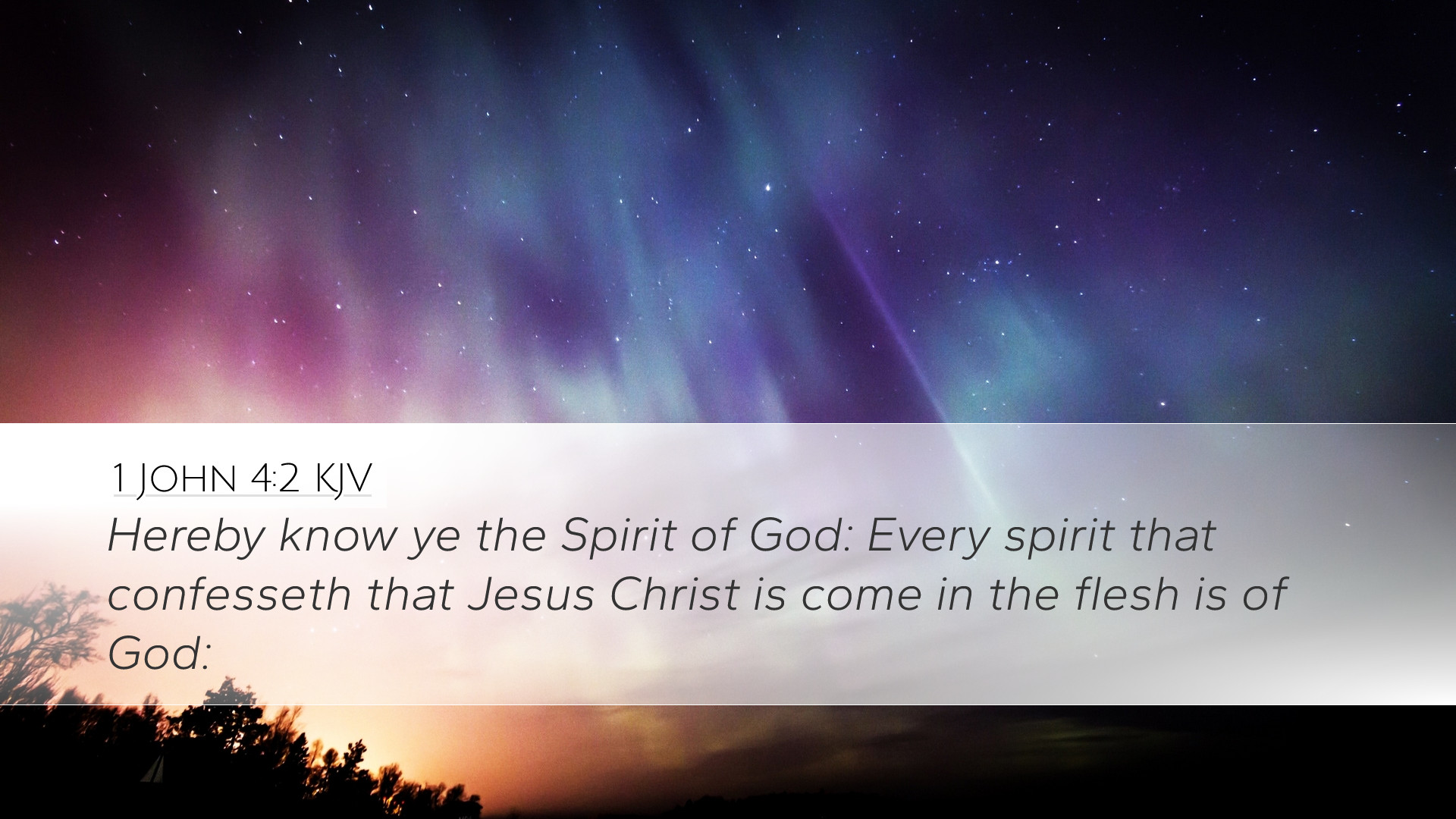Old Testament
Genesis Exodus Leviticus Numbers Deuteronomy Joshua Judges Ruth 1 Samuel 2 Samuel 1 Kings 2 Kings 1 Chronicles 2 Chronicles Ezra Nehemiah Esther Job Psalms Proverbs Ecclesiastes Song of Solomon Isaiah Jeremiah Lamentations Ezekiel Daniel Hosea Joel Amos Obadiah Jonah Micah Nahum Habakkuk Zephaniah Haggai Zechariah Malachi1 John 4:2
1 John 4:2 KJV
Hereby know ye the Spirit of God: Every spirit that confesseth that Jesus Christ is come in the flesh is of God:
1 John 4:2 Bible Commentary
Commentary on 1 John 4:2
Bible Verse: 1 John 4:2 (KJV) - "Hereby know ye the Spirit of God: Every spirit that confesseth that Jesus Christ is come in the flesh is of God."
Introduction
The verse from 1 John 4:2 serves as a crucial litmus test for discerning the authenticity of spiritual influences and doctrine within the Christian faith. It emphasizes the necessity of Christ's incarnation and the acknowledgment of Jesus as having genuinely come in the flesh. Through a synthesis of insights from respected public domain commentaries, we can gain a profound understanding of this verse's theological implications, historical context, and pastoral significance.
Theological Significance
John's epistle emphasizes that true spirituality must affirm the incarnation of Christ. This assertion builds a foundation for understanding the nature of God and His revelation through Jesus. Matthew Henry notes that the primary element of faith rests upon the acknowledgment of Christ's dual nature—fully divine and fully human.
- Incarnation as Central Doctrine: The affirmation that "Jesus Christ is come in the flesh" directly counters early heretical views, such as Gnosticism, which denied the physical reality of Christ. Adam Clarke remarks on the necessity of this confession, suggesting it serves as a protective barrier against false teachings that diminish Christ’s humanity.
- Role of the Spirit: By stating that the confession of Christ's incarnation is indicative of the Spirit of God, John highlights the Spirit's role in leading believers to truth. Albert Barnes discusses how true believers, filled with the Holy Spirit, naturally acknowledge this fundamental truth about Christ.
- The Nature of Confession: The act of confessing Christ as divinely incarnate involves not mere verbal acknowledgment but a deeper relational affirmation. This connection leads to a life that embodies the truth of the gospel, underscoring the principle that belief manifests in conduct.
Historical Context
Understanding the historical backdrop of 1 John is key to grasping its significance. During the time of this writing, the early church faced numerous challenges, including various heretical movements challenging the nature of Christ. John’s epistle addresses these deviations with clarity and strength, highlighting the importance of sound doctrine.
Matthew Henry elaborates on the societal context wherein the apostle writes to affirm believers against the doctrines that undermine Christ’s true nature. He emphasizes that knowing which spirits to listen to was vital for believers navigating faith within a diverse and often deceptive religious landscape.
Practical Application for Believers
This verse serves as an essential reminder for Christians today regarding the importance of sound doctrine and the recognition of authentic expressions of faith. It encourages believers to remain vigilant in their faith life. Adam Clarke highlights that every Christian should be equipped to discern spiritual influences by this apostolic standard.
- Discernment in Teaching: Pastors and church leaders must strive to teach the full doctrine of Christ's incarnation, ensuring that their congregations are well-informed about who Jesus is.
- Community Confession: Regular confession of faith within the church community reinforces the truth of the Gospel, fostering unity in belief and practice that is grounded in Christ's nature.
- Personal Reflection: Individual believers should engage in personal reflection about their understanding of Christ's nature and how this affects their relationship with God. This involves an honest evaluation of whether their faith acknowledges both the divinity and humanity of Christ.
Conclusion
1 John 4:2 stands as a foundational verse that calls for unwavering fidelity to the truth of Jesus Christ as come in the flesh. Through the insights of Matthew Henry, Albert Barnes, and Adam Clarke, it becomes evident that this confession is not merely an intellectual assent but a transformative declaration that shapes lives and communities. As pastors, students, and theologians study this text, they are reminded of their responsibility to uphold and proclaim the truth of who Christ is, ensuring that the essence of the gospel remains untainted in the face of contemporary challenges.


